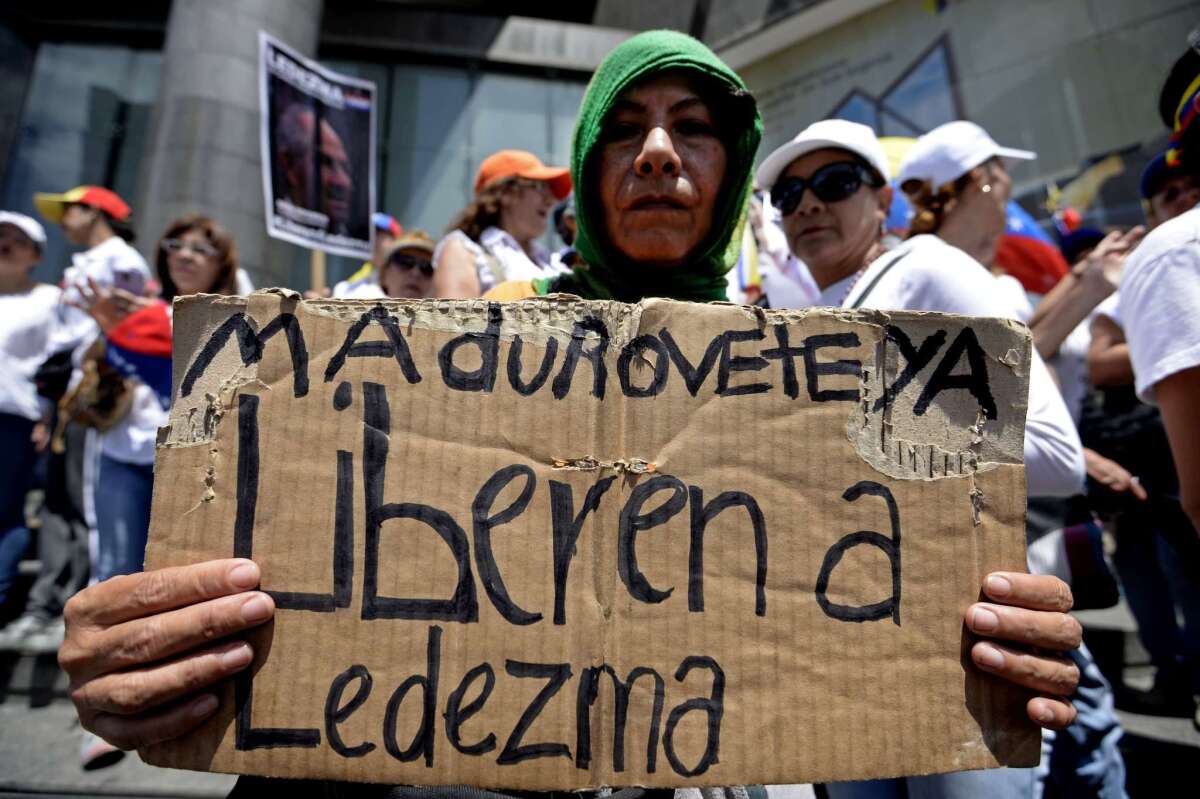U.S. announces sanctions against Venezuelan officials

- Share via
The Obama administration on Monday imposed sanctions on seven Venezuelan officials for alleged human rights violations, calling the country’s actions a threat to national security.
The sanctions target “Venezuelan officials past and present who violate the human rights of Venezuelan citizens and engage in acts of public corruption,” according to the White House. They will have their “assets and their use of U.S. financial systems blocked.”
This move comes amid heightening tensions between Venezuela and the United States. Venezuelan officials have set a deadline for the United States to reduce its diplomatic mission in the country from 100 to 17 diplomats, on par with the number of Venezuelan diplomats who serve in Washington.
Venezuelan President Nicolas Maduro has also claimed that his government has arrested several American spies and said that retaliatory measures would include imposing a visa requirement for American tourists. The U.S. has castigated Venezuela for what it calls anti-American rhetoric.
Maduro’s critics say that his claims against the United States are a way of distracting Venezuelans from a collapsing economy, which is expected to shrink between 6% and 7% this year amid growing scarcities of basic food items, triple-digit inflation and ongoing devaluation of the currency, the bolivar.
“We’ve seen many times that the Venezuelan government tries to distract from its own actions by blaming the United States or other members of the international community for events inside Venezuela,” said White House Press Secretary Josh Earnest. “These efforts reflect a lack of seriousness on the part of the Venezuelan government to deal with the grave situation it faces.”
The Maduro government has been roundly condemned by human rights groups, most recently by United Nations High Commissioner for Human Rights Zeid Raad Hussein, who last week criticized Maduro for authorizing the use of firearms against protesters and for subjecting rights activists to intimidation and harassment.
Maduro has taken a harder line against critics than his predecessor, Hugo Chavez, possibly, analysts say, because his approval ratings are much lower and he needs to distract Venezuelans from an abysmal economy.
The sanctions come less than two weeks after the mayor of metropolitan Caracas, Antonio Ledezma, a leader of Venezuela’s opposition coalition, was arrested Feb. 27 on charges of planning a coup against Maduro, charges that Ledezma has denied.
Another Maduro opponent, former Caracas borough mayor Leopoldo Lopez, has been in jail for more than a year for allegedly inciting violence during February 2014 demonstrations that swept the country and led to 43 deaths. Lopez said he advocated for peaceful protests only and that the deaths were caused mainly by government security forces.
Still another Maduro opponent, former National Assembly member Maria Corina Machado, was told in December that she faces charges of planning to assassinate Maduro for which she could be sentenced to up to 16 years of prison. She has described the charges as trumped up and a means to silence a critic.
Prior to her expulsion from the assembly for having supported the student protests, Machado was physically attacked on the floor of the legislature, but none of her assailants was censured.
Political analysts have theorized that Maduro’s hard line may be related to upcoming legislative elections. Depriving opposition candidates of the support of national leaders could ultimately blunt their messages, said political scientist Luis Salamanca of the University of Central Venezuela.
U.S. Treasury Secretary Jacob Lew said in a statement Monday that “corrupt actions by Venezuelan government officials deprive Venezuela of needed economic resources that could be invested in the Venezuelan people and used to spur economic growth.”
“These actions also undermine the public trust in democratic institutions and the human rights to which Venezuelan citizens are entitled,” Lew’s statement continued. “This executive order will be used to protect the U.S. financial system from the illicit financial flows from public corruption in Venezuela.
Lee reported from Los Angeles and Kraul from Bogota, Colombia.
More to Read
Sign up for Essential California
The most important California stories and recommendations in your inbox every morning.
You may occasionally receive promotional content from the Los Angeles Times.











